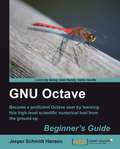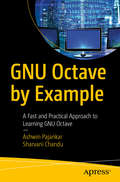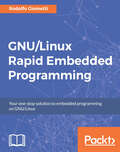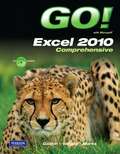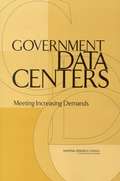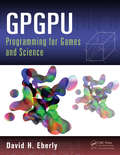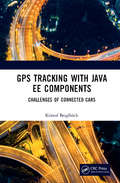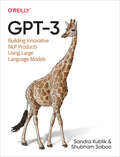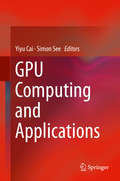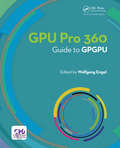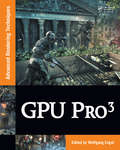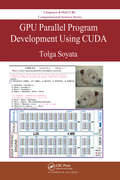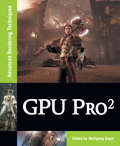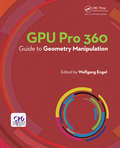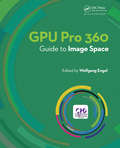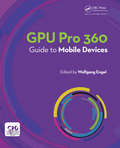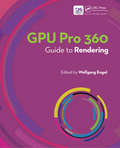- Table View
- List View
GNU Emacs Pocket Reference
by Debra CameronO'Reilly's Learning GNU Emacs covers the most popular and widespread of the Emacs family of editors. The GNU Emacs Pocket Reference is a companion volume to Learning GNU Emacs . This small book, covering Emacs version 20, is a handy reference guide to the basic elements of this powerful editor, presenting the Emacs commands in an easy-to-use tabular format.
GNU Octave Beginner's Guide
by Jesper Schmidt HansenThis is a practical, step-by-step guide that will help you to quickly become a proficient Octave user. The book is packed with clear examples, screenshots, and code to carry out your data analysis without any problems.This book is intended for anyone interested in scientific computing and data analysis. The reader should have a good level of mathematics and a basic understanding of programming will be useful, although it is not a prerequisite.
GNU Octave by Example: A Fast and Practical Approach to Learning GNU Octave
by Ashwin Pajankar Sharvani ChanduGet a quick start to learn, understand, and apply GNU Octave using a math- and programming-friendly approach. This book focuses on an end-to-end track to teach mathematical programming, data science, signal processing, and image processing with GNU Octave.GNU Octave by Example starts with an introduction to GNU Octave, a free and open-source alternative to MATLAB. Next, it explains the processes to install GNU Octave on popular operating systems such as Windows, Ubuntu, Raspberry Pi, and other platforms. Further, it covers hands-on exercises with GNU Octave exploring the basic functionality and command line in interactive mode. This is followed by covering matrices and various operations including how to read and analyze data from various sources. Moving forward, it introduces commonly used programming constructs in data visualization. It explains 2D and 3D data visualization along with data analysis. It also demonstrates the concepts related to geometry and its application with GNU Octave. It concludes with coverage of signal processing followed by image, video, and audio processing techniques.After reading this book, you will be able to write your own programs for scientific and numerical applications.What You Will Learn ● Understand the practical aspects of GNU Octave with math and programming-friendly abstractions● Install GNU Octave on multiple platforms including Windows, Raspberry Pi, and Ubuntu● Work with GNU Octave using the GUI, the command line, and Jupyter notebooks● Implement 2D and 3D data visualization and analysis with GNU OctaveWho This Book Is For Software engineers, data engineers, data science enthusiasts, and computer vision professionals.
GNU/Linux Rapid Embedded Programming: Your one-stop solution to embedded programming on GNU/Linux
by Rodolfo GiomettiAn annotated guide to program and develop GNU/Linux Embedded systems quicklyKey FeaturesRapidly design and build powerful prototypes for GNU/Linux Embedded systemsBecome familiar with the workings of GNU/Linux Embedded systems and how to manage its peripheralsWrite, monitor, and configure applications quickly and effectively, manage an external micro-controller, and use it as co-processor for real-time tasksBook DescriptionEmbedded computers have become very complex in the last few years and developers need to easily manage them by focusing on how to solve a problem without wasting time in finding supported peripherals or learning how to manage them. The main challenge with experienced embedded programmers and engineers is really how long it takes to turn an idea into reality, and we show you exactly how to do it. This book shows how to interact with external environments through specific peripherals used in the industry. We will use the latest Linux kernel release 4.4.x and Debian/Ubuntu distributions (with embedded distributions like OpenWrt and Yocto). The book will present popular boards in the industry that are user-friendly to base the rest of the projects on - BeagleBone Black, SAMA5D3 Xplained, Wandboard and system-on-chip manufacturers. Readers will be able to take their first steps in programming the embedded platforms, using C, Bash, and Python/PHP languages in order to get access to the external peripherals. More about using and programming device driver and accessing the peripherals will be covered to lay a strong foundation. The readers will learn how to read/write data from/to the external environment by using both C programs or a scripting language (Bash/PHP/Python) and how to configure a device driver for a specific hardware. After finishing this book, the readers will be able to gain a good knowledge level and understanding of writing, configuring, and managing drivers, controlling and monitoring applications with the help of efficient/quick programming and will be able to apply these skills into real-world projects. What you will learnUse embedded systems to implement your projectsAccess and manage peripherals for embedded systemsProgram embedded systems using languages such as C, Python, Bash, and PHPUse a complete distribution, such as Debian or Ubuntu, or an embedded one, such as OpenWrt or YoctoHarness device driver capabilities to optimize device communicationsAccess data through several kinds of devices such as GPIO's, serial ports, PWM, ADC, Ethernet, WiFi, audio, video, I2C, SPI, One Wire, USB and CANWho this book is forThis book targets Embedded System developers and GNU/Linux programmers who would like to program Embedded Systems and perform Embedded development. The book focuses on quick and efficient prototype building. Some experience with hardware and Embedded Systems is assumed, as is having done some previous work on GNU/Linux systems. Knowledge of scripting on GNU/Linux is expected as well.
GO with Microsoft: Office 2016 All in One (3rd Edition)
by Shelley Gaskin Alicia Vargas Debra Geoghan Nancy GraviettGO! with Office 2016 is the right approach to learning for today's fast-moving, mobile environment. The GO! Series focuses on the job and success skills students need to succeed in the workforce. With GO! All in One, you can teach Computer Concepts and Applications together - the way it is in the real world!
GO! With Microsoft Office 2013 Volume 1
by Shelley Gaskin Alicia Vargas Carolyn MclellanThe primary goal of the GO! Series, aside from teaching computer applications, is ease of implementation, with an approach that is based on clearly defined projects for students and a one-of-a-kind supplements package.
GO! with Microsoft Excel 2010, Comprehensive (GO!)
by Shelley Gaskin Alicia Vargas Suzanne MarksFor introductory computer courses on Microsoft Excel 2010 or courses in computer concepts with a lab component on Excel. Teach the course YOU want in LESS TIME! The primary goal of the GO! Series, aside from teaching computer applications, is ease of implementation. This approach is based on clearly defined projects for students and a one-of-a-kind supplements package for instructors.
GO! with Microsoft Powerpoint 2010, Comprehensive (GO!)
by Shelley Gaskin Alicia Vargas Donna Madsen Toni MaruccoFor introductory computer courses on Microsoft PowerPoint 2010 or courses in computer concepts with a lab component on PowerPoint. Teach the course YOU want in LESS TIME! The primary goal of the GO! Series, aside from teaching computer applications, is ease of implementation. This approach is based on clearly defined projects for students and a one-of-a-kind supplements package for instructors.
GOVERNMENT DATA CENTERS: Meeting Increasing Demands
by Committee on Coping Increasing Demands on Government Data CentersEnvironmental data centers have been successfully acquiring, disseminating, and archiving data for decades. However, the increasing volume and number of data sets, coupled with greater demands from more diverse users, are making it difficult for data centers to maintain the record of environmental change. This workshop report focuses on technological approaches that could enhance the ability of environmental data centers to deal with these challenges, and improve the ability of users to find and use information held in data centers. Among the major findings are that data centers should rely more on off-the-shelf technology -- including software and commonly available hardware -- and should shift from tape to disk as the primary storage medium. Such technological improvements will help solve many data management problems, although data centers and their host agencies will have to continue to invest in the scientific and human elements of data center operations.
GPGPU Programming for Games and Science
by David H. EberlyAn In-Depth, Practical Guide to GPGPU Programming Using Direct3D 11GPGPU Programming for Games and Science demonstrates how to achieve the following requirements to tackle practical problems in computer science and software engineering:RobustnessAccuracySpeedQuality source code that is easily maintained, reusable, and readableThe book primarily add
GPS Tracking with Java EE Components: Challenges of Connected Cars
by Kristof BeiglböckGPS Tracking with Java EE Components: Challenges of Connected Cars highlights how the self-driving car is actually changing the automotive industry, from programing embedded software to hosting services and data crunching, in real time, with really big data. <P><P>The book analyzes how the challenges of the Self Driving Car (SDC) exceed the limits of a classical GPS Tracking System (GTS.) It provides a guidebook on setting up a tracking system by customizing its components. It also provides an overview of the prototyping and modeling process, and how the reader can modify this process for his or her own software. <P><P>Every component is introduced in detail and includes a number of design decisions for development. The book introduces Java EE (JEE) Modules, and shows how they can be combined to a customizable GTS, and used as seed components to enrich existing systems with live tracking. <P><P>The book also explores how to merge tracking and mapping to guide SDCs, and focuses on client server programming to provide useful information. It also discusses the challenges involved with the live coordination of moving cars. <P><P>This book is designed to aid GTS developers and engineers in the automotive industry. It can also help Java Developers, not only interested in GPS Tracking, but in modern software design from many individual modules. Source code and sample applications will be available on the book's website.
GPT for Python-Coding in Computational Materials Science and Mechanics: From Prompt Engineering to Solutions in Worked-Out Examples (Studies in Computational Intelligence #1198)
by Bernhard EidelThis book covers all the topics about ChatGPT required to successfully generate Python code to solve problems in computational materials science and mechanics, complemented by numerous fully worked-out applications. The complete work flow for AI-assisted coding is given, including: (i) prompt engineering providing a powerful toolset for how to give coding assignments to ChatGPT effectively; (ii) commented code listings; and (iii) tips and tricks to verify the codes in rigorous tests including human interventions to fix issues and gaps. Finally, (iv) the coding projects are critically reviewed to address the strengths and remaining weaknesses of the Chatbot, including explicit recommendations on how to communicate with GPT. For the steps (i)–(iv) the book presents a curated selection of intriguing problems from computational materials science and computational mechanics including machine learning for problem-solving. These problems are carefully chosen for their relevance to current research and industrial applications and their suitability for showcasing the advanced capabilities of GPT-4 for code generation. Spanning from predicting material behavior under various conditions to simulating complex mechanical interactions, the problems serve as a canvas on which GPT-4 paints its solutions, demonstrating not just accuracy but creativity in problem-solving. Therefore, the book serves as a valuable primer for both undergraduate and graduate students, as well as a review for research scientists and practicing engineers.
GPT-3
by Sandra Kublik Shubham SabooGPT-3: NLP with LLMs is a unique, pragmatic take on Generative Pre-trained Transformer 3, the famous AI language model launched by OpenAI in 2020. This model is capable of tackling a wide array of tasks, like conversation, text completion, and even coding with stunningly good performance. Since its launch, the API has powered a staggering number of applications that have now grown into full-fledged startups generating business value. This book will be a deep dive into what GPT-3 is, why it is important, what it can do, what has already been done with it, how to get access to it, and how one can build a GPT-3 powered product from scratch.This book is for anyone who wants to understand the scope and nature of GPT-3. The book will evaluate the GPT-3 API from multiple perspectives and discuss the various components of the new, burgeoning economy enabled by GPT-3. This book will look at the influence of GPT-3 on important AI trends like creator economy, no-code, and Artificial General Intelligence and will equip the readers to structure their imaginative ideas and convert them from mere concepts to reality.
GPT-3: The Ultimate Guide To Building NLP Products With OpenAI API
by Sandra Kublik Shubham SabooGPT-3: The Ultimate Guide To Building NLP Products With OpenAI API is a comprehensive book on the Generative Pre-trained Transformer 3 AI language model, covering its significance, capabilities, and application in creating innovative NLP Products.Key FeaturesExploration of GPT-3: The book explores GPT-3, a powerful language model, and its capabilitiesBusiness applications: The book provides practical knowledge on using GPT-3 to create new business productsExamination of AI trends: The book examines the impact of GPT-3 on emerging creator economy and trends like no-code & AGIBook DescriptionGPT-3 has made creating AI apps simpler than ever. This book provides a comprehensive guide on how to utilize the OpenAI API with ease. It explores imaginative methods of utilizing this tool for your specific needs and showcases successful businesses that have been established through its use.The book is divided into two sections, with the first focusing on the fundamentals of the OpenAI API. The second part examines the dynamic and thriving environment that has arisen around GPT-3.Chapter 1 sets the stage with background information and defining key terms. Chapter 2 goes in-depth into the API, breaking it down into its essential components, explaining their functions and offering best practices. Chapter 3, you will build your first app with GPT-3.Chapter 4 features interviews with the founders of successful GPT-3-based products, who share challenges and insights gained. Chapter 5 examines the perspective of enterprises on GPT-3 and its potential for adoption. The problematic consequences of widespread GPT-3 adoption, such as misapplication and bias, are addressed along with efforts to resolve these issues in Chapter 6. Finally, Chapter 7 delves into the future by exploring the most exciting trends and possibilities as GPT-3 becomes increasingly integrated into the commercial ecosystem.What you will learnLearn the essential components of the OpenAI API along with the best practicesBuild and deploy your first GPT-3 powered applicationLearn from the journeys of industry leaders, startup founders who have built and deployed GPT-3 based products at scaleLook at how enterprises view GPT-3 and its potential for adoption for scalable solutionsNavigating the Consequences of GPT-3 adoption and efforts to resolve themExplore the exciting trends and possibilities of combining models with GPT-3 with No codeWho this book is forThis book caters to individuals from diverse backgrounds, not just technical experts. It should be useful to you if you are:A data expert seeking to improve your AI expertiseAn entrepreneur looking to revolutionize the AI industryA business leader seeking to enhance your AI knowledge and apply it to informed decision makingA content creator in the language domain looking to utilize GPT-3's language abilities for creative and imaginative projectsAnyone with an AI idea that was previously deemed technically unfeasible or too costly to execute
GPU Computing and Applications
by Yiyu Cai Simon SeeThis book presents a collection of state of the art research on GPU Computing and Application. The major part of this book is selected from the work presented at the 2013 Symposium on GPU Computing and Applications held in Nanyang Technological University, Singapore (Oct 9, 2013). Three major domains of GPU application are covered in the book including (1) Engineering design and simulation; (2) Biomedical Sciences; and (3) Interactive & Digital Media. The book also addresses the fundamental issues in GPU computing with a focus on big data processing. Researchers and developers in GPU Computing and Applications will benefit from this book. Training professionals and educators can also benefit from this book to learn the possible application of GPU technology in various areas.
GPU PRO 360 Guide to GPGPU
by Wolfgang EngelWolfgang Engel’s GPU Pro 360 Guide to GPGPU gathers all the cutting-edge information from his previous seven GPU Pro volumes into a convenient single source anthology that covers general purpose GPU. This volume is complete with 19 articles by leading programmers that focus on the techniques that go beyond the normal pixel and triangle scope of GPUs and take advantage of the parallelism of modern graphics processors to accomplish such tasks. GPU Pro 360 Guide to GPGPU is comprised of ready-to-use ideas and efficient procedures that can help solve many computer graphics programming challenges that may arise. <P><P>Key Features: <li>Presents tips & tricks on real-time rendering of special effects and visualization data on common consumer software platforms such as PCs, video consoles, mobile devices <li>Covers specific challenges involved in creating games on various platforms <li>Explores the latest developments in rapidly evolving field of real-time rendering <li>Takes practical approach that helps graphics programmers solve their daily challenges
GPU PRO 3: Advanced Rendering Techniques
by Wolfgang EngelGPU Pro3, the third volume in the GPU Pro book series, offers practical tips and techniques for creating real-time graphics that are useful to beginners and seasoned game and graphics programmers alike.Section editors Wolfgang Engel, Christopher Oat, Carsten Dachsbacher, Wessam Bahnassi, and Sebastien St-Laurent have once again brought together a h
GPU Parallel Program Development Using CUDA (Chapman & Hall/CRC Computational Science)
by Tolga SoyataGPU Parallel Program Development using CUDA teaches GPU programming by showing the differences among different families of GPUs. This approach prepares the reader for the next generation and future generations of GPUs. The book emphasizes concepts that will remain relevant for a long time, rather than concepts that are platform-specific. At the same time, the book also provides platform-dependent explanations that are as valuable as generalized GPU concepts. The book consists of three separate parts; it starts by explaining parallelism using CPU multi-threading in Part I. A few simple programs are used to demonstrate the concept of dividing a large task into multiple parallel sub-tasks and mapping them to CPU threads. Multiple ways of parallelizing the same task are analyzed and their pros/cons are studied in terms of both core and memory operation. Part II of the book introduces GPU massive parallelism. The same programs are parallelized on multiple Nvidia GPU platforms and the same performance analysis is repeated. Because the core and memory structures of CPUs and GPUs are different, the results differ in interesting ways. The end goal is to make programmers aware of all the good ideas, as well as the bad ideas, so readers can apply the good ideas and avoid the bad ideas in their own programs. Part III of the book provides pointer for readers who want to expand their horizons. It provides a brief introduction to popular CUDA libraries (such as cuBLAS, cuFFT, NPP, and Thrust),the OpenCL programming language, an overview of GPU programming using other programming languages and API libraries (such as Python, OpenCV, OpenGL, and Apple’s Swift and Metal,) and the deep learning library cuDNN.
GPU Pro 2
by Wolfgang EngelThis book focuses on advanced rendering techniques that run on the DirectX and/or OpenGL run-time with any shader language available. It includes articles on the latest and greatest techniques in real-time rendering, including MLAA, adaptive volumetric shadow maps, light propagation volumes, wrinkle animations, and much more. The book emphasizes te
GPU Pro 360 Guide to 3D Engine Design
by Wolfgang EngelWolfgang Engel’s GPU Pro 360 Guide to 3D Engine Design gathers all the cutting-edge information from his previous seven GPU Pro volumes into a convenient single source anthology that covers the design of a 3D engine. This volume is complete with articles by leading programmers that focus on various aspects of 3D engine design such as quality and optimization as well as high-level architecture. GPU Pro 360 Guide to 3D Engine Design is comprised of ready-to-use ideas and efficient procedures that can help solve many computer graphics programming challenges that may arise. <P><P>Key Features: <li>Presents tips & tricks on real-time rendering of special effects and visualization data on common consumer software platforms such as PCs, video consoles, mobile devices <li>Covers specific challenges involved in creating games on various platforms <li>Explores the latest developments in rapidly evolving field of real-time rendering <li>Takes practical approach that helps graphics programmers solve their daily challenges
GPU Pro 360 Guide to Geometry Manipulation
by Wolfgang EngelWolfgang Engel’s GPU Pro 360 Guide to Geometry Manipulation gathers all the cutting-edge information from his previous seven GPU Pro volumes into a convenient single source anthology that covers geometry manipulation in computer graphics. This volume is complete with 19 articles by leading programmers that focus on the ability of graphics processing units to process and generate geometry in exciting ways. GPU Pro 360 Guide to Geometry Manipulation is comprised of ready-to-use ideas and efficient procedures that can help solve many computer graphics programming challenges that may arise. <P><P> Key Features: <li> Presents tips and tricks on real-time rendering of special effects and visualization data on common consumer software platforms such as PCs, video consoles, mobile devices <li> Covers specific challenges involved in creating games on various platforms <li> Explores the latest developments in the rapidly evolving field of real-time rendering <li> Takes a practical approach that helps graphics programmers solve their daily challenges
GPU Pro 360 Guide to Image Space
by Wolfgang EngelWolfgang Engel’s GPU Pro 360 Guide to Image Space gathers all the cutting-edge information from his previous seven GPU Pro volumes into a convenient single source anthology that covers various algorithms that operate primarily in image space. This volume is complete with 15 articles by leading programmers speaks to the power and convenience of working in screen space. GPU Pro 360 Guide to Image Space is comprised of ready-to-use ideas and efficient procedures that can help solve many computer graphics programming challenges that may arise. <P><P> Key Features: <li>Presents tips & tricks on real-time rendering of special effects and visualization data on common consumer software platforms such as PCs, video consoles, mobile devices <li>Covers specific challenges involved in creating games on various platforms <li>Explores the latest developments in rapidly evolving field of real-time rendering <li>Takes practical approach that helps graphics programmers solve their daily challenges
GPU Pro 360 Guide to Lighting
by Wolfgang EngelWolfgang Engel’s GPU Pro 360 Guide to Lighting gathers all the cutting-edge information from his previous seven GPU Pro volumes into a convenient single source anthology on lighting. This volume is complete with 24 articles by leading programmers that describes rendering techniques of global illumination effects suited for direct rendering applications in real time. GPU Pro 360 Guide to Lighting is comprised of ready-to-use ideas and efficient procedures that can help solve many computer graphics programming challenges that may arise. <P><P>Key Features: <li>Presents tips and tricks on real-time rendering of special effects and visualization data on common consumer software platforms such as PCs, video consoles, and mobile devices <li>Covers specific challenges involved in creating games on various platforms <li>Explores the latest developments in the rapidly evolving field of real-time rendering <li>Takes a practical approach that helps graphics programmers solve their daily challenges
GPU Pro 360 Guide to Mobile Devices
by Wolfgang EngelWolfgang Engel’s GPU Pro 360 Guide to Mobile Devices gathers all the cutting-edge information from his previous seven GPU Pro volumes into a convenient single source anthology that covers computer graphics in mobile devices. This volume is complete with 18 articles by leading programmers that focus on the ability of graphics processing units to process and generate geometry in exciting ways. GPU Pro 360 Guide to Mobile Devices is comprised of ready-to-use ideas and efficient procedures that can help solve many computer graphics programming challenges that may arise. <P><P>Key Features: <li>Presents tips & tricks on real-time rendering of special effects and visualization data on common consumer software platforms such as PCs, video consoles, mobile devices <li>Covers specific challenges involved in creating games on various platforms <li>Explores the latest developments in rapidly evolving field of real-time rendering <li>Takes practical approach that helps graphics programmers solve their daily challenges
GPU Pro 360 Guide to Rendering
by Wolfgang EngelWolfgang Engel’s GPU Pro 360 Guide to Rendering gathers all the cutting-edge information from his previous seven GPU Pro volumes into a convenient single source anthology that covers real-time rendering. This volume is complete with 32 articles by leading programmers that focus on the ability of graphics processing units to process and generate rendering in exciting ways. GPU Pro 360 Guide to Rendering is comprised of ready-to-use ideas and efficient procedures that can help solve many rendering programming challenges that may arise. Key Features: Presents tips and tricks on real-time rendering of special effects and visualization data on common consumer software platforms such as PCs, video consoles, and mobile devices Covers specific challenges involved in creating games on various platforms Explores the latest developments in the rapidly evolving field of real-time rendering Takes a practical approach that helps graphics programmers solve their daily challenges

